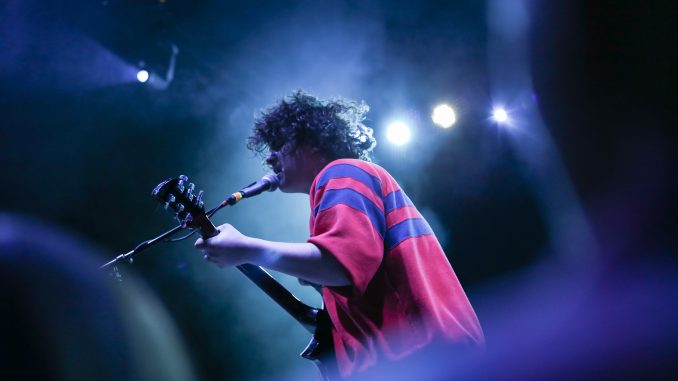
Chris Ward doesn’t think an age restriction should be put on live music.
Ward, the talent buyer and promotions manager at Johnny Brenda’s, a 250-person capacity venue in Fishtown, books 250 shows per year at the club, but only those 21 years or older are permitted to attend.
“Music is something that transcends age and it creates a kind of weird class system that you have to be 21 to enjoy music,” Ward said. “Clearly you don’t.”
Pennsylvania state laws and the layout of Johnny Brenda’s – one entrance for all patrons – prohibits Ward from booking all ages shows. Venues like Union Transfer host all ages shows and serve alcohol to patrons of age, due to separate entrances to the general admission floor and bar areas within the venue.
As an employee of Johnny Brenda’s, Ward said he is frustrated by what he calls “arcane laws,” and as one half of the Philadelphia-based band Pattern is Movement, he has seen how other countries handle minors in a setting where alcohol is typically served. He said in many countries the legal drinking age is lower and laws are less strict than those found in the United States.
Underage musicians at Johnny Brenda’s present Ward with an additional challenge. Ward said staff members don’t typically check identification in the venue, but must exercise extra caution when underage musicians perform.
“You have to be in a different mindset when it comes to how the show gets produced,” Ward said. “It’s something the agent has talked to me about. I have talked with my production manager and the production manager talks to the tour manager. At the same time, it’s not as if they are not allowed to hang out and talk with their fans, but we definitely keep an eye on them. It’s a balancing act.”
The all-ages music scene thrives in DIY spaces and house venues around the city, but R5 Productions, a Philadelphia-based booking company, has helped establish venues that serve alcohol and still accommodate an all-ages crowd.
Sean Agnew, founder of R5 Productions, has been part of the booking team at Union Transfer since the venue opened in 2011. R5 focuses on all-ages spaces in Philadelphia, but books shows at 21 and over spaces including Boot & Saddle and The Dolphin Tavern in South Philadelphia and Morgan’s Pier on the Delaware River Waterfront.
Agnew said in an email that hosting all-ages shows results in a bigger audience for the bands performing.
Underage concertgoers have gravitated toward these venues due, in part, to age accommodations and cheaper ticket prices.
“The bulk of the shows I go to are at Union Transfer, PhilaMoca or The Church,” said Corey DiEmedio, a freshman business management major. “While there is the occasional cool show at Johnny Brenda’s [my attendance of those shows] wouldn’t exponentially increase.”
For others, the bands performing at a show, and not the venue where the show is held, is often the deciding factor in attending a show.
“Just because there are people playing at a 21 and up show that I may know, if I don’t think they are that great, I’m not going to go out of my way to get a fake ID to see a show,” said Jason Loux, a freshman computer science major.
In September, Angew announced that weekly shows at the First Unitarian Church would be winding down. According to Agnew, the R5 team is looking to open more all-ages spaces in the future.
The Bureau of Liquor Control Enforcement is responsible for enforcing the laws applied to music venues. Sergeant Dan Steele, the District Office Commander of the Philadelphia Office of the Bureau of Liquor Control Enforcement, said the office rarely receives complaints about venues in the city, but other problems still exist.
Steele said scannable fake IDs present the biggest problems for staff at venues in the city. Employees who are not careful can allow underage patrons to enter a 21 and over club.
Ward noted that an all-ages venue that doesn’t serve alcohol is often difficult to manage and ensure a high profit margin. A venue similar to Union Transfer that serves alcohol but opens the venue to an all-ages crowd is, in Ward’s eyes, ideal.
“I don’t know why 16 year olds can’t be around other people drinking alcohol, if there is a way to manage it,” Ward said. “I completely believe that you have to manage it.”
Tim Mulhern can be reached at timothy.mulhern@temple.edu.



Be the first to comment